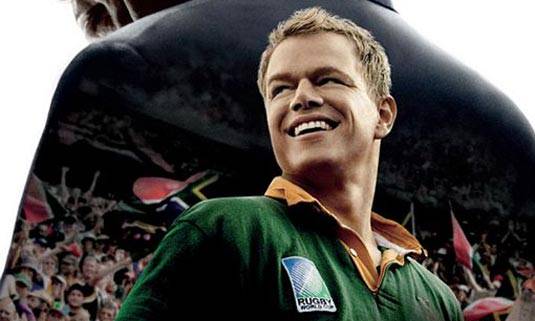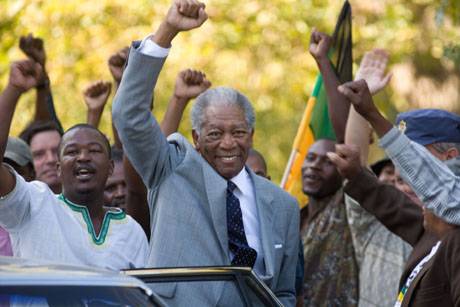 Invictus is Latin, a word meaning “invincible.” It is also the tile of a poem written by William Henley in 1875. Faced with a devastating illness that included the amputation of his leg, he penned this poem from his hospital bed. Little did he know that years later, Nelson Mandela in a 3 ft. jail cell would use his very words to strengthen himself during the injustice of his imprisonment. And Mandela would once again turn to Invictus to rally an unlikely rugby team to victory.
Invictus is Latin, a word meaning “invincible.” It is also the tile of a poem written by William Henley in 1875. Faced with a devastating illness that included the amputation of his leg, he penned this poem from his hospital bed. Little did he know that years later, Nelson Mandela in a 3 ft. jail cell would use his very words to strengthen himself during the injustice of his imprisonment. And Mandela would once again turn to Invictus to rally an unlikely rugby team to victory.
Such is the premise for this Clint Eastwood directed film that relates a chapter from history that needs telling.
“He can win an election, but can he run a country?” South African newspapers blast this from the headlines after Nelson Mandela, recently released from a 27-year prison term, emerges four years later in the political arena as the president of South Africa. A fair question, Mandela himself concedes, but the task is admittingly overwhelming. In some respects, the racial divide has never been stronger between the whites and the blacks, the wounds of apartheid still gaping. Mandela looks to the unlikeliest of sources the Springboks, the predominantly white South African rugby team—for many a symbol of apartheid itself—to heal his country and bridge the racial divide.
Morgan Freeman as Nelson Mandela rises above imitation and caricature to represent this dynamic leader of South Africa, his role endorsed by Mandela himself who long wanted to have Freeman play him in a story of his life. And it will not surprise me in the least to see Morgan Freeman Oscar-nominated for his role. He seemingly perfectly captures the spirit of Nelson Mandela, a man whose legendary imprisonment only seemed to make him stronger and more tolerant, as he literally smiles in the face of his oppressors and tirelessly plods forward, even as members of his own cabinet express their displeasure and flat-out skepticism . It is clear that his own personal life is problematic. Indeed his bodyguard explains it by stating “He’s not a saint, but a man with a man’s problems ” and his estrangement from his wife Winnie and his children is apparent. Nevertheless he embraces his “family of 42 million” and tries to re-envision a new future for the embattled country of South Africa.
. It is clear that his own personal life is problematic. Indeed his bodyguard explains it by stating “He’s not a saint, but a man with a man’s problems ” and his estrangement from his wife Winnie and his children is apparent. Nevertheless he embraces his “family of 42 million” and tries to re-envision a new future for the embattled country of South Africa.
Rugby, termed a “hooligan’s game played by gentleman” seems the unlikeliest of platforms for the radical ideological shifting that needs to happen to overcome racial prejudice. Francois Pienaar, played by Matt Damon, is just a frustrated rugby team captain all too accustomed to losing. In another powerful performance, Damon gives an amazing turn as the team captain, who is initially reluctant to go beyond the limits of the sports arena, but inspired by Mandela, becomes fully committed to reuniting the country through his unlikely plan.
Invictus is powerful and inspiring, the kind of atypical sports movie that avoids clichés and emerges as something greater and resounding with meaning and majesty. The last lines of the poem: I am the master of my fate/I am the captain of my soul stirs something in all of us that may just be a long-buried dream. For a mere movie to accomplish this is revelatory and Invictus therefore becomes the revelation that moviegoers have been awaiting.
Invictus is now playing at the Beverly and Savoy cinemas.








